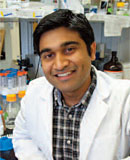
Ph.D. candidate
Evans Award Winner
The medical school has one of the largest cadres of graduate students in the U.S. This spring, for instance, 175 students earned advanced degrees and 46 of those were doctoral degrees. Size is a good thing if it supports all aspects of graduate training and encourages collaboration and shared learning experiences. However, with so many classmates, it can be difficult to stand out in the crowd.
The Herbert John Evans Jr. Award in Biochemistry is named for the late medical school professor and was established by his colleagues to honor the most outstanding senior graduate student in the department of biochemistry and molecular biology.
Abir Mukherjee studies lipid signaling in cancer and how a particular lipid, lysophosphatidic acid (LPA), might contribute to progression of disease. He’s linked the metabolic effects of LPA to a specific receptor that is overexpressed in many human malignancies, which has implications for potential therapies. As Mukherjee says: “If we can block LPA receptor 2 mediated signaling, we may thwart cancer progression.”
Mukherjee works in the laboratory of Frank Fang, Ph.D., associate professor of biochemistry, who has been impressed with his student’s motivation, general knowledge, broad interests and commitment to cancer research. Indeed, Mukherjee hopes to find a postdoctoral position in a different research field so that he can broaden his scientific experience.
Mukherjee was particularly happy to receive the Evans award, because it meant being recognized as the most outstanding student of the year. But he also is grateful for the opportunities that a large graduate program has offered him during his studies. “Collaborations are key here,” he says. “We talk to each other, students and faculty alike. It really enriches your experience.”

